Financial Markets React Negatively to Reducing Emergency Economic Stimulus
Stock-Markets / Financial Markets 2009 Oct 31, 2009 - 08:36 AM GMT Incomes are steady, but confidence is waning. -Spending by U.S. consumers fell in September for the first time in five months after the government’s auto-rebate program expired.
Incomes are steady, but confidence is waning. -Spending by U.S. consumers fell in September for the first time in five months after the government’s auto-rebate program expired.
The 0.5 percent decrease in purchases matched the median estimate of economists surveyed by Bloomberg News and followed a 1.4 percent jump in the prior month, Commerce Department figures showed today in Washington. Incomes were unchanged, while the savings rate climbed. Stagnant wages and concern over mounting unemployment are causing confidence to wane, raising the risk that consumers will retrench in coming months as government assistance programs run out. The report also showed inflation was lower than the Federal Reserve’s long-term projection, indicating the policy makers can keep rates low.
Are the world banks turning off the spigot?
The liquidity tide is turning. Authorities across large parts of the world have either begun to tighten the spigot or are taking steps to wean their economies off emergency stimulus. This is a treacherous moment for markets.
Teun Draaisma, Morgan Stanley's equity strategist, said investors should move with care as central banks awaken. A study of 19 "bear market" rallies over recent decades shows that bourses tend to tip over as the US Federal Reserve starts tightening. Equities fall back 25pc over the next 13 months on average. It is unlikely to be better this time. "Given the amount of leverage in the economy, little changes in rates can have a disproportionate impact. The poor state of government finances, the high supply of bonds, and the fear of inflation could further exaggerate a bond market sell-off once tightening starts," he said.
Can the market hold up in these conditions?
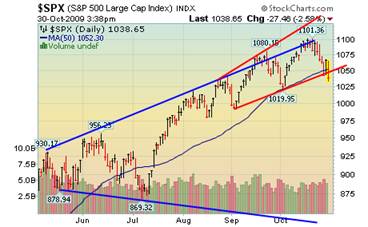 --…M3 broad money supply has contracted over the last six months, confounding expectations that ultra-low interest rates would soon boost monetary growth. The picture is even starker in America where M3 has shrunk at an annual rate of 6.5pc over the last three months, a pace of contraction not seen since the 1930s. US bank loans have plummeted since May. Where is the liquidity going?
--…M3 broad money supply has contracted over the last six months, confounding expectations that ultra-low interest rates would soon boost monetary growth. The picture is even starker in America where M3 has shrunk at an annual rate of 6.5pc over the last three months, a pace of contraction not seen since the 1930s. US bank loans have plummeted since May. Where is the liquidity going?
Treasuries trashed in October.
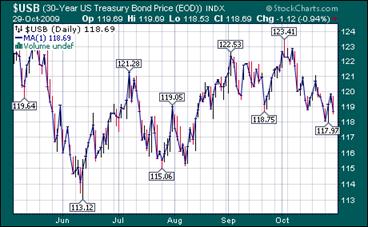 -- Treasuries rose, trimming a monthly loss, as a report showing consumer spending declined in September spurred speculation recovery from the deepest slump since the Great Depression will be slow.
-- Treasuries rose, trimming a monthly loss, as a report showing consumer spending declined in September spurred speculation recovery from the deepest slump since the Great Depression will be slow.
“The big question people are looking to have answered is if the economy will be able to free-stand on its own without government intervention and fiscal stimulus,” said Thomas Tucci, head of U.S. government bond trading at RBC Capital Markets in New York.
The gold rally may be losing steam.
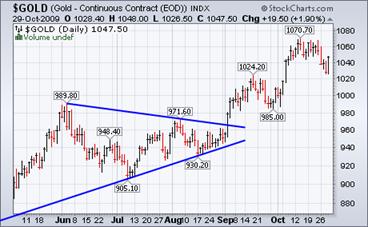 --Gold fell, heading for the first weekly loss since late September, as a strengthening U.S. dollar cut demand for the precious metal as an alternative asset. Investment in the SPDR Gold Trust, the biggest exchange- traded fund backed by bullion, is down 0.3 percent this week as the dollar rebounded from a 14-month low. Gold reached a record $1,072 an ounce on Oct. 14.
--Gold fell, heading for the first weekly loss since late September, as a strengthening U.S. dollar cut demand for the precious metal as an alternative asset. Investment in the SPDR Gold Trust, the biggest exchange- traded fund backed by bullion, is down 0.3 percent this week as the dollar rebounded from a 14-month low. Gold reached a record $1,072 an ounce on Oct. 14.
The Nikkei scrambles back from a steep fall.
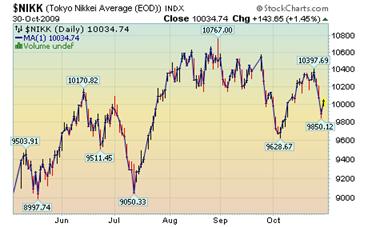 -- Japanese stocks rose for the first time in four days after reported earnings exceeded estimates and a report showed the unemployment rate unexpectedly declined. The Nikkei 225 Stock Average rose 1.5 percent to 10,034.74 at the market close in Tokyo. The broader Topix index added 1.4 percent to 894.67, with more than two stocks advancing as declining. The broad gauge sank 1.7 percent this month and has increased 4.1 percent this year.
-- Japanese stocks rose for the first time in four days after reported earnings exceeded estimates and a report showed the unemployment rate unexpectedly declined. The Nikkei 225 Stock Average rose 1.5 percent to 10,034.74 at the market close in Tokyo. The broader Topix index added 1.4 percent to 894.67, with more than two stocks advancing as declining. The broad gauge sank 1.7 percent this month and has increased 4.1 percent this year.
But is China’s recovery real?
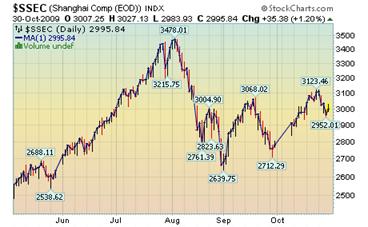 -- China’s stocks advanced, with the Shanghai Composite Index gaining for a second month, as Industrial & Commercial Bank of China Ltd. and Bank of China Ltd. beat profit estimates. The Shanghai Composite Index advanced 35.38, or 1.2 percent, to 2,995.85 at the close. The measure rallied 7.8 percent this month, the most since July, as government stimulus spending and record loans growth propelled the economy to the fastest pace in a year in the third quarter. The gauge is up 65 percent this year.
-- China’s stocks advanced, with the Shanghai Composite Index gaining for a second month, as Industrial & Commercial Bank of China Ltd. and Bank of China Ltd. beat profit estimates. The Shanghai Composite Index advanced 35.38, or 1.2 percent, to 2,995.85 at the close. The measure rallied 7.8 percent this month, the most since July, as government stimulus spending and record loans growth propelled the economy to the fastest pace in a year in the third quarter. The gauge is up 65 percent this year.
Will the dollar carry trade be crushed?
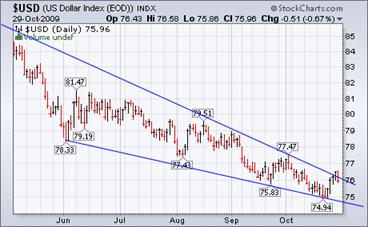 The yen and dollar gained versus the euro and extended their first weekly gains in four weeks amid concern the global economic recovery may stall as stimulus measures wind down, reducing demand for riskier assets. said Alan Ruskin, head of international currency strategy in North America at RBS Securities Inc. in Stamford, Connecticut, in an interview on Bloomberg Radio. “A lot of people have been on the same trade, the short dollar and the long risk trade. It feels like there will be some risk position squaring before year-end.” A short position is a bet a currency will decline.
The yen and dollar gained versus the euro and extended their first weekly gains in four weeks amid concern the global economic recovery may stall as stimulus measures wind down, reducing demand for riskier assets. said Alan Ruskin, head of international currency strategy in North America at RBS Securities Inc. in Stamford, Connecticut, in an interview on Bloomberg Radio. “A lot of people have been on the same trade, the short dollar and the long risk trade. It feels like there will be some risk position squaring before year-end.” A short position is a bet a currency will decline.
Housing stocks are on the brink.
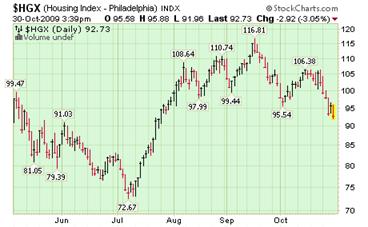 --Sales of new homes dropped unexpectedly last month as the effects of a temporary tax credit for first-time owners started to wane.
--Sales of new homes dropped unexpectedly last month as the effects of a temporary tax credit for first-time owners started to wane.
The Commerce Department said Wednesday that sales fell 3.6 percent to a seasonally adjusted annual rate of 402,000 from a downwardly revised 417,000 in August. Economists surveyed by Thomson Reuters had expected a pace of 440,000.
Crude inventories are not rising as expected.
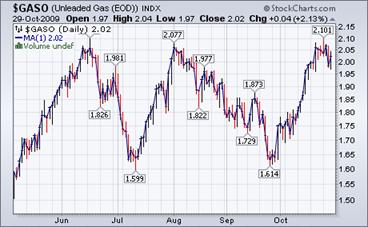 The Energy Information Agency weekly report suggests, “The U.S. average price for regular gasoline increased for the third consecutive week, shooting up a dime to $2.67 per gallon. For the first time since October 20, 2008, the national average price is now higher than it was the year before. Nonetheless, the average was $1.44 below the all-time high price set on July 7, 2008. Prices increased in all the major regions of the country.”
The Energy Information Agency weekly report suggests, “The U.S. average price for regular gasoline increased for the third consecutive week, shooting up a dime to $2.67 per gallon. For the first time since October 20, 2008, the national average price is now higher than it was the year before. Nonetheless, the average was $1.44 below the all-time high price set on July 7, 2008. Prices increased in all the major regions of the country.”
Weather may affect natural gas prices for a season.
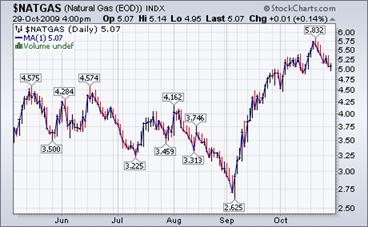 The Energy Information Agency’s Natural Gas Weekly Update reports, “Natural gas spot prices decreased on the week at all market locations, except for a couple trading points in the Rockies and Florida markets. Decreases ranged between 6 and 46 cents per MMBtu, although the majority of trading locations posted declines between 25 and 35 cents. Despite the snowfall and winter-like temperatures in the Rockies region this week, only one trading location registered a modest increase, with the remaining trading locations in the area decreasing.”
The Energy Information Agency’s Natural Gas Weekly Update reports, “Natural gas spot prices decreased on the week at all market locations, except for a couple trading points in the Rockies and Florida markets. Decreases ranged between 6 and 46 cents per MMBtu, although the majority of trading locations posted declines between 25 and 35 cents. Despite the snowfall and winter-like temperatures in the Rockies region this week, only one trading location registered a modest increase, with the remaining trading locations in the area decreasing.”
Conversataion with Art Cashin.
Art is always informative and insightful in his thoughts about the market. Here is Friday morning’s interview.
Joe Saluzzi On The Economy, Transaction Taxes, Fund Flows And Other Topics
Here’s another interview of Joe Saluzzi on CNBC. A great video clip.
On October 30, 1930…
Market wrap: “Necessitous liquidation” resulted in further bad breaks in “the main body of stocks.” Wholesale margin calls were sent out overnight due to the extraordinary decline in Monday's session; this caused heavy early liquidation for those accounts “unable or unwilling” to add funds. The market ignored positive morning announcements on lower call rates and margin requirements. An avalanche of selling proceeded through the morning, leaving no stocks untouched, though the decline was again orderly; bankers were said placing bids to prevent “demoralization from overwhelming the market.”
Our Investment Advisor Registration is on the Web
We are in the process of updating our website at www.thepracticalinvestor.com to have more information on our services. Log on and click on Advisor Registration to get more details.
If you are a client or wish to become one, please make an appointment to discuss our investment strategies by calling Connie or Tony at (517) 699-1554, ext 10 or 11. Or e-mail us at tpi@thepracticalinvestor.com .
Anthony M. Cherniawski,
President and CIO
http://www.thepracticalinvestor.com
As a State Registered Investment Advisor, The Practical Investor (TPI) manages private client investment portfolios using a proprietary investment strategy created by Chief Investment Officer Tony Cherniawski. Throughout 2000-01, when many investors felt the pain of double digit market losses, TPI successfully navigated the choppy investment waters, creating a profit for our private investment clients. With a focus on preserving assets and capitalizing on opportunities, TPI clients benefited greatly from the TPI strategies, allowing them to stay on track with their life goals
Disclaimer: The content in this article is written for educational and informational purposes only. There is no offer or recommendation to buy or sell any security and no information contained here should be interpreted or construed as investment advice. Do you own due diligence as the information in this article is the opinion of Anthony M. Cherniawski and subject to change without notice.
Anthony M. Cherniawski Archive |
© 2005-2022 http://www.MarketOracle.co.uk - The Market Oracle is a FREE Daily Financial Markets Analysis & Forecasting online publication.



